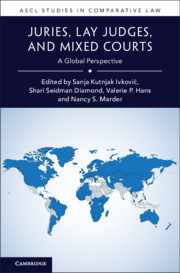Book contents
- ASCL Studies In Comparative Law
- Juries, Lay Judges, and Mixed Courts
- Copyright page
- Contents
- Editors
- Contributors
- Acknowledgments
- 1 Introduction
- Part I Advances in Lay Participation
- Part II Enduring Systems of Lay Participation
- Part III Challenges to Lay Participation in Law
- Part IV Global Perspectives on Lay Participation
- 14 What Hollywood, USA, Teaches the World (Incorrectly and Correctly) about Juries
- 15 The Case for a Hybrid Jury in Europe
- 16 A Worldwide Perspective on Lay Participation
- Name Index
- Subject Index
- References
15 - The Case for a Hybrid Jury in Europe
from Part IV - Global Perspectives on Lay Participation
Published online by Cambridge University Press: 03 August 2021
- ASCL Studies In Comparative Law
- Juries, Lay Judges, and Mixed Courts
- Copyright page
- Contents
- Editors
- Contributors
- Acknowledgments
- 1 Introduction
- Part I Advances in Lay Participation
- Part II Enduring Systems of Lay Participation
- Part III Challenges to Lay Participation in Law
- Part IV Global Perspectives on Lay Participation
- 14 What Hollywood, USA, Teaches the World (Incorrectly and Correctly) about Juries
- 15 The Case for a Hybrid Jury in Europe
- 16 A Worldwide Perspective on Lay Participation
- Name Index
- Subject Index
- References
Summary
This chapter traces the decline of the traditional jury across the criminal justice systems in Europe and argues the case for a hybrid jury to take its place. The chapter contrasts common-law and civil-law systems and considers why the jury has been a remarkably enduring institution across common-law systems but has been less successful in being transplanted onto continental European soil. The chapter also identifies certain pressures in common-law systems that have led to calls for the jury to be made more accountable. The chapter then argues that, against the background of a growing convergence between procedural systems, a case can be made for adopting a modern hybrid jury across Europe that retains the key feature of the traditional jury, namely that laypersons decide the verdict, but combines this with the need for the jury to provide some justification for its verdict.
- Type
- Chapter
- Information
- Juries, Lay Judges, and Mixed CourtsA Global Perspective, pp. 304 - 322Publisher: Cambridge University PressPrint publication year: 2021

